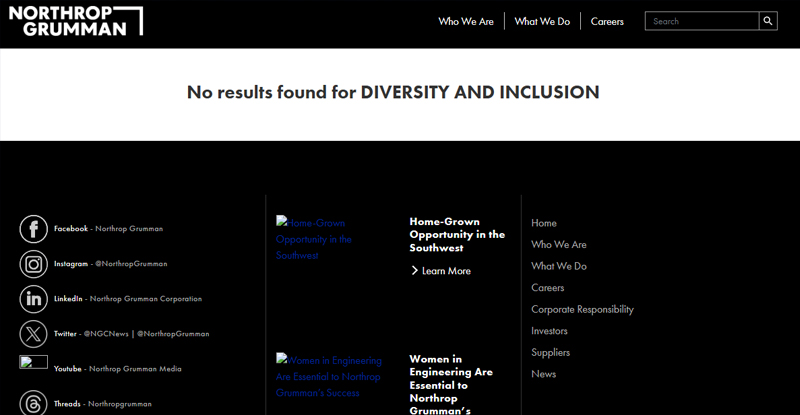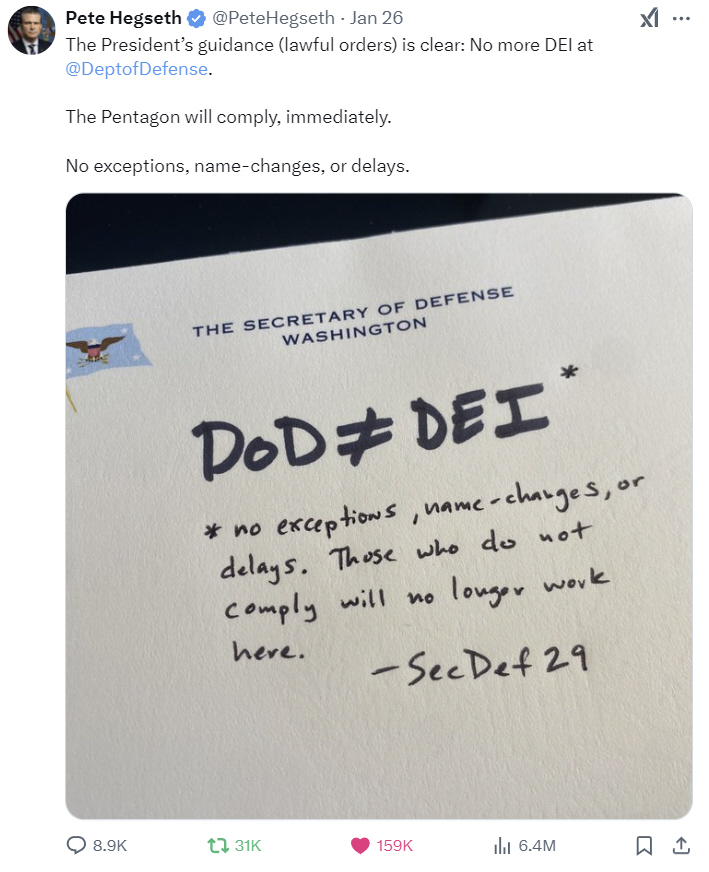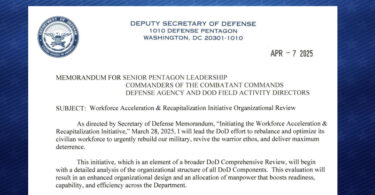By Valerie Insinna and Michael Marrow | Breaking Defense
A month ahead of the #NatSecGirlSquad conference in March, organizer Maggie Feldman-Piltch is facing a problem that has been unprecedented in her 10 years of putting on the event.
In the wake of President Donald Trump’s Jan. 21 executive order, which directs federal contractors to roll back diversity, equity and inclusion (DEI) practices, there has been radio silence from defense companies who previously bought exhibit space, underwrote meals and otherwise sponsored the conference.
“Nobody,” she said, “is returning emails.”
It’s just one example of how, in the wake of Trump’s executive order, defense contractors are beating a hasty retreat from their previous commitments to DEI initiatives and reshaping their public-facing images to fit the administration’s vision — spelled out in felt-tip pen by Defense Secretary Pete Hegseth in his first memo to the Pentagon, that “DoD ≠ DEI.”
Major defense primes are scrubbing their websites to remove references to DEI, including pulling down content associated with minority employees or celebrations like Black History Month.
Breaking Defense found that large defense companies like BAE Systems, General Dynamics, L3Harris, Lockheed Martin, Northrop Grumman and RTX have clumsily removed webpages associated with previous DEI initiatives, which still appear in search engine results but redirect to dead links.
One industry official, who Breaking Defense granted anonymity to discuss sensitive internal matters, said that defense companies are struggling to understand exactly which activities fall under the umbrella of “illegal DEI.”
A company maintaining a DEI department or employing officials hired solely to enact DEI practices would likely run afoul of the executive order, but other longstanding practices aimed at recruiting talent and fostering professional development of employees reside in a gray area, where it will be up to companies to determine how much risk to take, the official said.
Those include activities like employee resource groups that allow workers to connect with others from similar backgrounds and supplier diversity programs focused on ensuring that major defense companies work with small businesses run by women, racial minorities, veterans or other historically disadvantaged groups.
Internally, companies are also concerned that Trump’s crackdown on DEI could encourage whistleblowers to lodge complaints about any company activities related to diversity — potentially opening the door to litigation — or increase the likelihood of workplace bullying or harassment of women, people of color or LGBTQ employees, the official said.
Pointing to measures like a federal tipline that would enable government employees to report on verboten DEI initiatives, Luke Schleusener, CEO of the non-profit group Out in National Security, argued that “It’s a waste of time and effort to pump people full of fear so that they’re looking over their shoulder at the office rather than letting them do their job keeping us safe.”
But industry has little choice but to follow Trump’s mandate or potentially face retribution, said one former defense official.
“No one wants to become a target in an environment where it is clear the administration is prepared to make examples and targets out of other organizations,” they said.
Defense Companies Rush To Bury DEI
The Jan. 21 executive order, titled “Ending Illegal Discrimination and Restoring Merit-Based Opportunity,” lays out a series of instructions impacting federal contractors.
It mandates that all future federal contracts include terms where contractors would certify that they do not operate “any programs promoting DEI that violate any federal anti-discrimination laws.”
It also directs the Department of Labor’s office of Federal Contract Compliance to hold federal contractors and subcontractors responsible for any acts that could be considered “affirmative action” or workforce balancing based on race, sex, sexual preference, religion or national origin. (The order specifically retains federal and private-sector employment and contracting preferences for veterans.)
Finally, to further deter private sector DEI activities, the order instructs the attorney general to work with heads of federal agencies to develop a report outlining “key sectors of concern” as well as “the most egregious and discriminatory DEI practitioners” — a move that could put companies in the line of fire for further government action, including litigation and the loss of government contracts.
According to the order, the report would enable each agency to identify “up to nine potential civil compliance investigations of publicly traded corporations, large non-profit corporations or associations” or other institutions, as well as “litigation that would be potentially appropriate for federal lawsuits.”
Trump’s executive order — along with a corresponding Jan. 20 order that ended DEI initiatives inside the federal government — led to swift changes inside and out of the Pentagon. Immediately after their signing, the military services rushed to purge any vestiges of DEI from their ranks — and industry quickly followed suit.
“I think larger companies, especially public companies, may feel particularly at risk because if there should become a target list of companies that are going to get challenged on stuff, it tends to be the larger, high-profile ones,” the former defense official said. “Those are probably the ones that are going to be more risk-averse here.”
Because the order was signed just ahead of earnings calls, recent regulatory filings reveal a noticeable change in how the defense primes characterize their positions on diversity.
Lockheed Martin in a Jan. 23 statement said it would take immediate action “to ensure continued compliance” with the order, and that “merit-based talent management programs” have always been central to its mission as a weapons producer.
“We will not have goals or incentives based on demographic representation or Affirmative Action Plans,” the company said. “Additionally, our training offerings are compliant with Executive Order 13950 from President Trump’s first administration. We will continue to help America and its allies achieve peace through strength by recruiting, retaining and promoting the best aerospace and defense talent in the world, with the only criteria being merit and performance.”
The company swiftly deleted DEI content from its website — such as a story on Black History Month published in 2023 that now redirects to the firm’s general news page but is still archived online — and has also removed references to DEI in its latest financial disclosures to investors.
In an annual regulatory filing for 2023, Lockheed Martin said under a subsection titled “Diversity and Inclusion” that “Diversity and inclusion is a business imperative for us, as we believe that it is key to our future success.” That language no longer appears in the 2024 report published in January.
In a statement released after the executive order was signed, Northrop said it was “actively reviewing our policies and processes and taking the necessary steps to ensure compliance” with the order, adding that “we hire, promote and pay based on merit and performance.” It did not respond to a request for further comment.
Northrop in its 2023 annual report included a “diversity, equity and inclusion” section, which stated that the company “strive[s] to reach all parts of the diverse talent pools available now and in the future because we recognize that we benefit from having coworkers with different ideas, perspectives and approaches to help us innovate.”
That section, and accompanying language, no longer appears in the company’s 2024 annual report published in January, though the document does retain lightly edited language under a “Human Capital” subheading that emphasizes the company “value[s] diverse perspectives and foster[s] safe and inclusive environments.”
RTX said it was taking actions to comply with the order and that “our highly dedicated workforce is built and advances on merit.”
Accordingly, the company has dropped a DEI section from its 2024 annual report published in February, no longer using language that appeared in the 2023 report that said “We strive to advance a diverse, equitable, and inclusive work environment.”
The firm has also taken down pages on its website associated with DEI and LGBTQ pride. RTX declined further comment.
L3Harris, which previously espoused a goal of “developing a workforce that is half women and more than one third people of color, reflective of the communities where it operates,” declined to comment on how it was applying the order.
The company also appears to have removed past annual reports dedicated specifically to DEI, but some previous versions can still be found online, such as the 2022 report [PDF] where CEO Chris Kubasik declared that the firm’s “commitment to diversity, equity and inclusion (DE&I) is unwavering.”
A spokesman for BAE Systems, which also took down its DEI website for its US-based arm, told Breaking Defense that the company continuously reassesses its priorities and policies to ensure continued compliance with the law, including the new executive orders.
“We strive to ensure our employees feel valued and respected, and we will continue to hire, promote, and compensate based on merit,” the BAE spokesman said. “Celebrating our mission-centered culture and our focus on technology, we will maintain our ability to attract and retain exceptional talent to develop the cutting-edge solutions that set us apart.”
Nevertheless, UK-based BAE still has an active DEI page for its UK and international business, highlighting the cross-Atlantic tensions Trump’s executive order may invite for defense contractors.
General Dynamics took down its webpage on “Diversity and Inclusion” on Feb. 7, following questions from Breaking Defense about the webpage and how the company was approaching the order. A spokesman said that the company “always complies with the law,” but declined to comment further on company policy.
In a departure from other defense contractors, Boeing shut down its DEI department in October prior to the presidential election, reflecting new CEO Kelly Ortberg’s realignment of the company, reported Bloomberg News at the time.
Sara Liang Bowen, the vice president who led the DEI unit, departed the company while other employees previously in the DEI department were transferred to human resources.
Boeing did not respond to a request for comment on whether it has taken further action since the publication of the executive order. The company has removed its DEI website but maintains a page on “People and Culture.”
Defense industry organizations are also wrestling with whether to continue initiatives geared toward the recruitment and professional development of women and minority groups.
AFCEA International, a professional organization centered on defense information technology, ended all DEI-centric programming, including its Women in AFCEA initiative, after the release of the Jan. 20 executive order, confirmed Sandra Jontz, its vice president of communications.
The organization has taken down webpages for its Women in AFCEA mentorship program and its women’s leadership network.
“This was not an easy decision for the leadership team,” Jontz said. “However, we did so as we do not want to lose the momentum and progress we have made over the past several years in deepening our relationships with the military and the federal government. The critical nature of our military, government, academia and industry collaboration in our efforts to strengthen global security means we cannot jeopardize the participation of our vital federal partners.
“We have and will always stand against discrimination in everything we do and continue our merit-based programs to ensure we raise awareness and recognize the very best of AFCEA as a collective body of professionals,” she said.
The Aerospace Industries Association and National Defense Industrial Association declined to comment.
Readiness Impact?
It was widely expected that Trump would move to roll back DEI efforts when he took office, and the Pentagon has followed suit, as Hegseth quickly pushed out a flurry of memos that halt certain gender-affirming medical procedures for transgender servicemembers, stop department celebrations of Black History Month and other holidays, and rename Fort Liberty in North Carolina to Fort Bragg (though the name now honors a WWII Army soldier and not the Confederate general).
Already a major talking point among Trump supporters, the accusations that diversity efforts have led to a decline in military readiness took center stage less than 24 hours after the deadliest civilian aviation incident in the US in nearly two decades, when Trump repeatedly indicated his belief that DEI practices led to the fatal crash between a Black Hawk helicopter and a civilian airliner.
And even before he was nominated to lead the US military, Hegseth stated that DEI efforts have harmed America’s ability to defend itself.
“Why do you get rid of something like DEI? From our perspective, it’s served the purpose of dividing the force instead of uniting the force,” Hegseth said during a Feb. 7 town hall at the Pentagon.
“I think the single dumbest phrase in military history is, ‘Our diversity is our strength.’ I think our strength is our unity, our strength is our shared purpose, regardless of our background, regardless of how we grew up, regardless of our gender, regardless of our race.”
Unsurprisingly, those comments don’t align with how the previous administration views things.
“The idea that we have an inferior military because we’re promoting people who aren’t qualified is insane,” Frank Kendall, who served as Air Force secretary from 2021 until Trump’s inauguration, told Breaking Defense. “Standards are standards, and we didn’t change them.”
Regardless, the military services have already begun withdrawing from events and halting relationships with organizations centered on increasing the number of women and racial minorities in the defense sector.
On Tuesday, Military.com reported that the Army has dropped out of an awards ceremony for Black engineers that was previously seen as a recruiting event, while USNI reported that the Navy has canceled memorandums of understanding with three naval organizations that promote diversity.
Those critical of Trump’s focus on rolling back DEI efforts argue that the Pentagon and defense industry are already competing against the more lucrative commercial tech industry for talent, and cannot afford to alienate potential employees.
“This is going to damage readiness and national security by pushing people out,” Schleusener of Out in National Security told Breaking Defense.
Alex Wagner, who served as the Air Force’s assistant secretary for manpower and reserve affairs under the Biden administration and has held other roles in the Pentagon and industry groups, especially highlighted that defense contractors also need to remain competitive against tech companies that are often vying for the same pool of workers.
“Aerospace and defense CEOs see their industry as in a race with Silicon Valley for talent,” he said in an interview. “And they’re right: this distinction between ‘tech companies’ and defense contractors has vanished; when you’re engineering autonomous systems and quantum sensors, you’re a tech company, full stop.”
For Feldman-Piltch, the Trump administration’s moves to combat DEI are not surprising, but the effect on the #NatSecGirlSquad conference is disappointing, given the organization’s apolitical nature and the fact that membership is not restricted to women.
“We are the largest organization in the world of people focused on building and sustaining competent diversity in national security and defense, whatever diversity means,” she said. “You can think of that as gender, you can think of it as race, you can think of it as ethnicity. You can also think of it as [diversity in] skill set.”
And with companies from legacy defense primes to tech startups competing to hire highly qualified engineers, software developers and cybersecurity specialists, there has never been more of a need to identify talent, she added.
“You have defense tech booming,” Feldman-Piltch said. “They need people. Where on earth are they expecting to get them?”









Leave a Comment